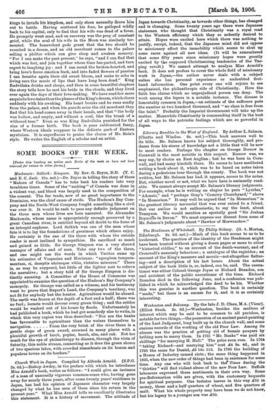SOME BOOKS OF THE WEEK.
[Under this 'heading we notice such Books of the week as have not been reserved for review in other forme.]
Mackenzie: Selkirk : Simpson. By Rev. G. Bryce, D.D. (T. C. and E. C. Jack. 21s. net.)—Dr. Bryce in telling the story of these
"Makers of Canada" has to take back his readers into very
troublous times. Some of the "making" of Canada was done in a violent way, and blood was largely used in the composition of
the cement. The fur trade, now of no great importance to the Dominion, was the chief cause of strife. The Hudson's Bay Com- pany and the North-West Company fought something like a civil war over it. It would be rash to pass any definite judgment on the three men whose lives are here narrated. Sir Alexander Mackenzie, whose name is appropriately enough preserved by a great Canadian river, is entitled beyond all doubt to the fame of an intrepid explorer. Lord Selkirk was one of the men whose fate it is to lay the foundations of greatness which others enjoy.
He certainly is the one of the three with whom the outside reader is most inclined to sympathise. He sacrificed so much and gained so little. Sir George Simpson was a very shrewd manager of affairs and of men. Take any two of the three, and one might use the words in which Tacitus sums up his estimates of Vespasian and Mucianus: " egregium tempera- menttun, si, demptis utriusque vitiis, virtntes misceres." There is, as may be supposed, but little of the lighter sort to relieve the narrative ; bat a story told of Sir George Simpson is dis- tinctly amusing. A Committee of the House of Commons was appointed to examine the question of the Hudson's Bay Company's monopoly. Sir George was called as a witness, and his testimony . went to prove that Rupert's Land, the Company's territory, was not fit for anybody but the hunter. Agriculture would be absurd. The earth was frozen at the depth of a foot and a half ; there was no fuel ; locusts would devour every green thing ; and the settler
would be washed out of his house by floods. Unfortunately he had published a book, which he had got somebody else to write, in
which this very region was thus described : "Nor are the banks
less favourable to agriculture than the waters themselves to
navigation From the very brink of the river there is a
gentle slope of green sward, crowned in many places with a plentiful growth of birch, poplar, beech, elm, and oak. Not too much for the eye of philanthropy to discern, through the vista, of futurity, this noble stream, connecting as it does the green shores of two spacious lakes, with crowded steamboats on its bosom and populous towns on its borders."










































 Previous page
Previous page